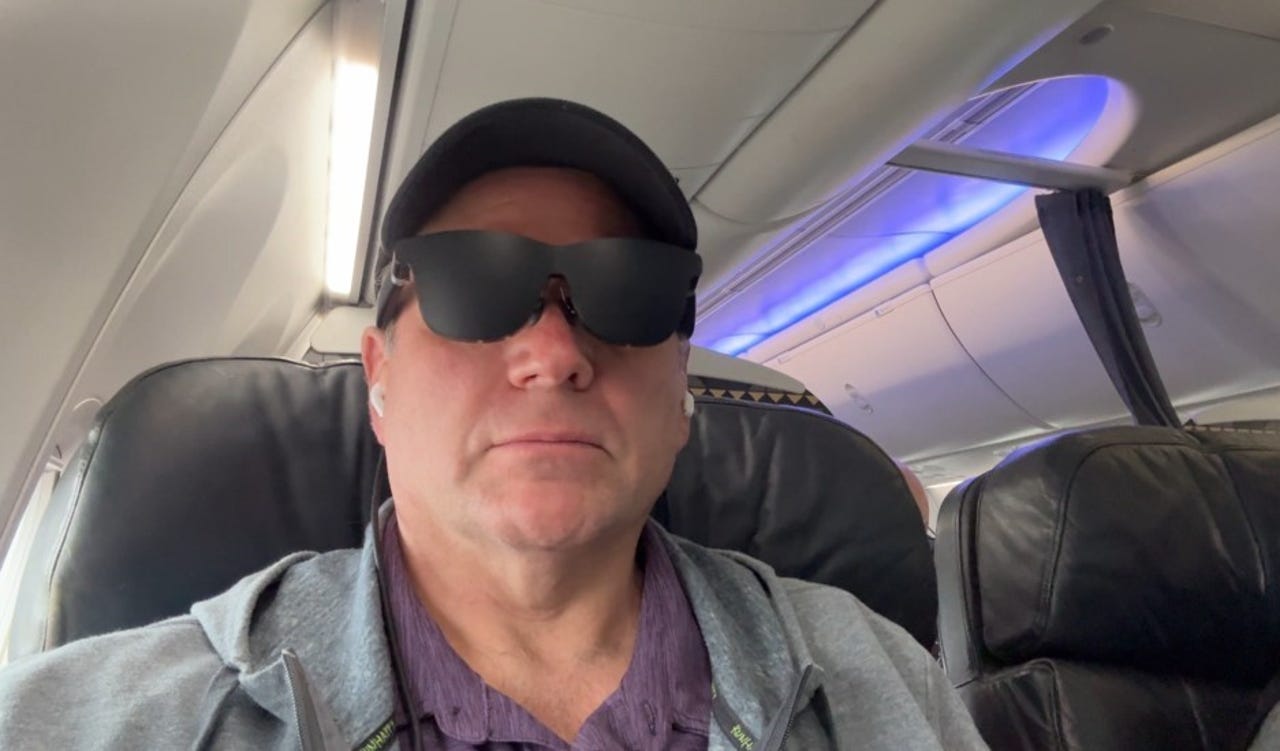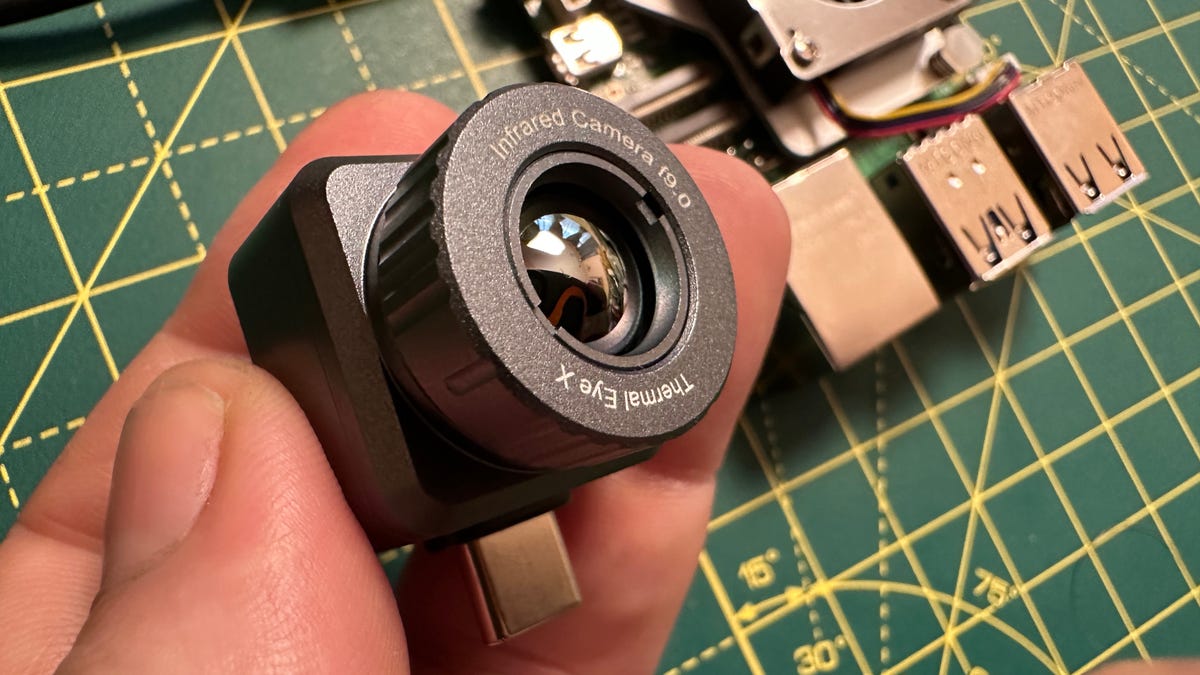BOOK THIS SPACE FOR AD
ARTICLE ADWhat's the deal?
Viture has released a new flagship Viture One Pro model, but its previous model remains a fantastic option for XR glasses. For Amazon Prime Day the company is offering 30% off the glasses and discounts on key accessories:
Viture One Glasses: $299 (more than 30% off)Viture One Dock Pack: $379 (more than 30% off)Viture One Duo Pack: $689 (more than 30% off)Viture Mobile Dock: $89 (more than 30% off)Viture One Cloud Pack: $499 (nearly 20% off)Viture One iPhone 15 Pack, $380 (more than 20% off)Viture One Lightning iPhone Pack, $388 (more than 20% off)Also: The best Prime Day deals: Live updates
Although I've tried multiple VR devices in the past (Google's Daydream and Samsung's phone-based VR products) I hadn't been fully convinced of the usefulness of VR for my own purposes. It wasn't until I saw the reviews of the Apple Vision Pro that I decided to further explore the AR/VR/XR options that could optimize my work and play environments. It took testing three different products and a handful of software updates until I was finally convinced that there is indeed a product that could improve my productivity while also helping me enjoy some down time.
My work commute includes almost 45 minutes of train riding each way with limited tablespace to get work done. I also travel at least once monthly for work with a laptop as my primary computer. Work in my home and business offices is optimized by two external displays, so commuting with just a single small laptop display is a challenge for me to work on.
Review: Apple Vision Pro: Fascinating, flawed, and needs to fix 5 things
I also like to watch movies and YouTube videos while traveling, something I have done (like most people) for decades on my mobile devices. But today there are better options out there that simulate the big screen experience, so I figured it was time to try out some new technology. Unfortunately, it wasn't to be.
Why I returned the Apple Vision Pro
I previously detailed my productivity experiences with the Apple Vision Pro before ultimately returning the headset to Apple. I would have kept it to test future software updates, but I value my marriage of more than 30 years and wasn't willing to lose my spouse for $4,300. The major productivity concern was the limit of one MacOS display shown virtually. For someone used to working with multiple screens, this was unfortunately a dealbreaker. For now, at least.
Matthew Miller/ZDNETWhy I returned the Meta Quest 3
Even though ZDNET awarded the Meta Quest 3 its best product of 2023 award, up to this point I hadn't tried it. But after learning that the Quest 3 supported multiple virtual desktop displays, I went ahead and ordered a Quest 3 in an attempt to expand my laptop work experience.
Frankly, I was blown away by the Meta Quest 3 and couldn't believe how close of an experience it was to Apple's Vision Pro, despite the Vision Pro being seven times more expensive. Gaming is clearly a focus of the Quest 3 and in this area it far exceeds what Apple is currently offering, but ultimately, that wasn't why I wanted to try it out.
What I really wanted to see was how it handled the workplace. So, I installed Immersed, Remote Desktop, and Meta Horizons Workroom on the headset and on my MacBook Pro. Immersed and Meta Horizons Workroom both provide three, or more, virtual displays via a wireless connection to the headset and I was banking on this working well for my commuting and business travel.
However, just as I was confident that the Meta Quest 3 was the headset for me, the folks at Viture dropped SpaceWalker for MacOS. I tried this out for an hour and was so impressed, I had to fill out the return for for the Quest 3. Who knows, I may still keep it around for home use since it still is fun to enter the VR space and escape from reality from time-to-time.
Matthew Miller/ZDNETWhy I'm sticking with the Viture One XR glasses
XR glasses are designed to provide you with a large virtual display, but in a lightweight sunglasses form factor. I first tried the XReal Air 2 Pro, but returned them after a few days because the visual clarity was disappointing, and I didn't find the Nebula software useful at all as it provided limited apps in a flashy VR form.
With a 15-hour flight from LA to Brisbane coming up, however, I ordered the new Viture One XR glasses and Mobile Dock accessory and decided to give them a try. These are similar to the XReal Air 2 Pro, but I found them more comfortable and the optics worked better for me. The diopter dial above each eye was a game changer as it allowed me to use the glasses with and without my contact lenses on. They work with iOS, Android, MacOS, Windows, and gaming platforms like the Nintendo Switch.
Also: 3 likely reasons why Quest 3 is more popular with users than other Meta VR headsets
My long flights to and from Australia flew by with content I downloaded from Apple TV, Netflix, Amazon, and more, along with several games on my Nintendo Switch. The glasses are comfortable, lightweight, and powered by the devices providing the content. In terms of productivity, a single extended display was supported natively from my MacBook Pro and Surface Pro.
This single extended display that requires periodic peeking under the glasses to see what's on the laptop offers little enhancement to me, since the high resolution display on the MacBook Pro is top-tier on its own, and better for when I need to get some serious work done. Thus, the Viture One XR glasses are best used for simulating a big screen entertainment from a phone or gaming console.
Matthew Miller/ZDNETBut the Viture One XR glasses still had some tricks up its sleeve. This week, SpaceWalker was publicly released for MacOS and it is a game changer for the Viture One XR glasses.
SpaceWalker is a companion software application that was first available for iOS with fairly limited functionality that was more of a VR technology demonstration rather than a practical application. It is also available now for Android phones, but you should also know that the Viture glasses support Samsung DeX for most Samsung phones.
Also: Meta Quest 3 vs. Apple Vision Pro: How accurate was Zuckerberg's review?
With SpaceWalker, I now have up to three virtual displays of my computer with settings present to optimize the experience. This function alone propelled the Viture One XR glasses to the top of my list for productivity, and combined with the media and connected gaming support, I am completely satisfied. In my opinion, the Viture One XR glasses ultimately beat out Apple's Vision Pro and the Meta Quest 3 in terms of usefulness across both productivity, gaming, and media applications.
There is currently no version of SpaceWalker for Windows, but the ARMoni application looks promising and is next on my list of things to try out.
.png)
 4 months ago
14
4 months ago
14 















 Bengali (Bangladesh) ·
Bengali (Bangladesh) ·  English (United States) ·
English (United States) ·